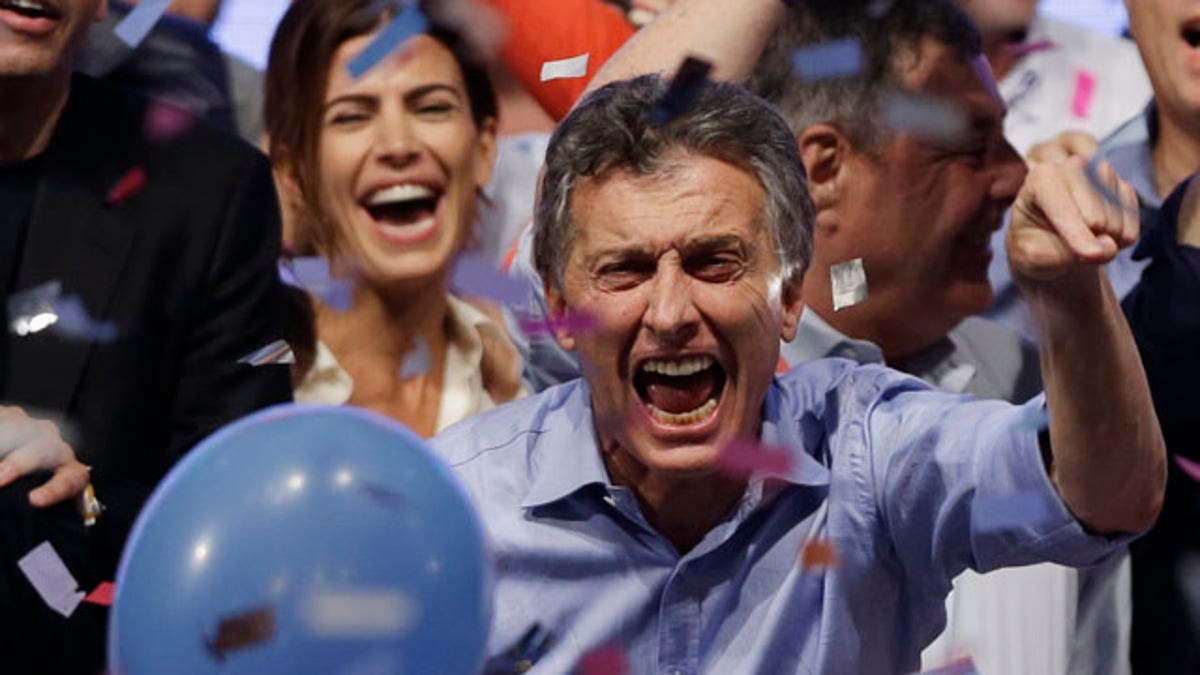
Nov. 22, 2015: Opposition presidential candidate Mauricio Macri and his wife Juliana Awada, back left, celebrate after winning Argetina's runoff presidential election in Buenos Aires. (AP Photo/Ricardo Mazalan)
BUENOS AIRES, Argentina – Opposition candidate Mauricio Macri won Argentina's presidential election on Sunday, marking an end to the left-leaning and often-combative era of President Cristina Fernandez, who along with her late husband dominated the country's political scene for 12 years and rewrote its social contract.
Ruling party candidate Daniel Scioli, Fernandez's chosen successor, conceded late Sunday and said he had called Macri to congratulate him on a victory that promises to chart Argentina on a more free market, less state interventionist course.
"Today is a historic day," said Macri, addressing thousands of cheering supporters as horns were heard blaring across Buenos Aires. "It's the changing of an era."
With 98 percent of the vote counted, Macri had 51.45 percent support compared to 48.55 percent for Scioli.
The victory by the business-friendly Macri, who gained a national profile as president of the popular Boca Juniors soccer club, comes after he did better than expected in the first round on Oct. 25. The close first round forced a runoff with Scioli, the governor of the vast Buenos Aires province.
Macri, the outgoing mayor of Buenos Aires, hails from one of the country's richest families. On the campaign trail, he sometimes talked about being kidnapped in the early 1990s, an experience he said helped him understand the needs of others and he credits with pushing him into politics.
As mayor of Argentina's most important city, he was known for a technocrat manner that stressed efficiency over style.
He campaigned for president on promises to reform and jumpstart the South American country's sagging economy. He also pledged to lead by "listening more and speaking less" than Fernandez, something he frequently said on the campaign trail.
"I'm so happy," said Julia Juarez, a 66-year-old retired teacher who was one of thousands watching the returns at Macri's bunker. "Argentines are tired of this government. Tired of the corruption. We are ready for something new."
Scioli, who had been expected to win by 10 or more points in last month's six-candidate first round of voting, tried to regain momentum before Sunday's runoff by frequently attacking Macri. He said a Macri win would subject this nation of 41 million people to the market-driven policies of the 1990s, a period of deregulation that many Argentines believe set the stage for the financial meltdown of 2001-2002.
Macri's win signals a clear end to the era of Fernandez, who along with her late husband and predecessor, Nestor Kirchner, rewrote the country's social contract, gaining both rabid followers and fierce critics along the way. People often refer to their combined years in power as the "Kirchner era."
The power couple spent heavily on programs for the poor, raised tariffs to protect local economies and passed several progressive laws, including the legalization of gay marriage in 2010.
"This is a painful day for Argentines," said Rocio Robador, a government supporter who was crying in the iconic Plaza de Mayo. Robador, 36, said she was able to get pregnant and have a child thanks to a government that helps poor women get fertility treatments.
Macri frequently repelled Scioli's claim that Macri represented policies of the past, saying he would lead with "21st century development" as opposed to "21st century socialism" - a term used by supporters of the late Venezuelan President Hugo Chavez and his successor, Nicolas Maduro.
The Dec. 10 change of power will come at a time when Argentina's economy, Latin America's third largest, has stalled. Inflation is around 30 percent, gross domestic product growth is just above zero and many private economists warn that the Fernandez administration's spending is not sustainable.
Macri has promised to address the economic problems and to shake things up regionally. If elected, he said, he would push to expel Venezuela from the South American trade bloc known as Mercosur because of the jailing of opposition leaders under Maduro. That would be a huge change for a continent where many countries, including neighbors Chile, Brazil and Bolivia, have left-leaning democratic governments that have maintained close ties with Venezuela.
Over the course of the campaign, both candidates at times tried to straddle the center. Scioli said he would solve a long-standing New York court fight with creditors in the U.S. who Fernandez calls "vultures" and has refused to negotiate with. Macri flipped his position and voiced support for the nationalization of the YPF oil company and Aerolineas Argentina, popular actions by the Fernandez administration.
But there were also clear differences.
Macri promised to lift unpopular controls on the buying of U.S. dollars and thus eliminate a booming black market for currency exchange. Doing that would likely lead to a sharp devaluation of the Argentine peso. With low foreign reserves, the government would desperately need an immediate infusion of dollars.
Those could come from many different places, but ultimately would require structural changes to a largely protectionist economy, solving the debt spat and developing warmer relations with other nations, including the United States.
